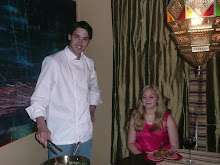In this article from the Christian Science Monitor, the author James L. Cavallaro, is persuading his readers to take a closer look at the importance of accountability for the alleged wrongdoings of the Bush Administration. This article strongly appeals to Bush-hating liberals and possibly non-partisans who feel misinformed. These are people who’ve had good faith in their elected leaders, but now feel the need to discern the sincerity of public information. The article incites the readers to find the truth. But, when will they know they’ve come to the truth? What degree of the truth is accessible to Americans? How would the truth commission go about conducting plausible investigations? Will the findings help or hinder the current administrations spirit and goals? Information from people is normally based on their opinion so, it would be difficult to decipher and interpret the truth.
Instead, we as country should focus on correcting future mistakes. Not to minimize the situation, but it is futile to backtrack. Hypothetically, it would open a can of worms and dissection is messy. Dissent so strong could lead to civil unrest, especially in economic depression. Exploiting the truth would be detrimental to what little sense of patriotism we have left. This is one of the government’s greatest fears and the people's greatest objectives. So, to believe thatBush-era wrongdoings and political exploitations will never happen again is quite naïve. Watergate is just one of the many examples of this. If President Nixon had had the power and technology that the Bush Administration had he might not have been caught. One would also be naïve to believe that there aren’t any injustices committed by our government, but technology has made it tremendously easier for governments to cover their tracks, making it increasingly hard to punish them. The media has shown that there have been illegal actions taken that should be investigated and punished, and some have been. However, our country is in no financial state to be conducting some big witch hunt to pick apart the Bush Administration. It is reminiscent of the Red Scare which only created greater tension and unnecessary widespread violence. It is obvious that the author feels that truth is an everlasting crusade for knowledge, which is spelled out in our natural rights.
Cavallaro is a clinical professor of law at Harvard Law School. He worked in human rights in Pinochet's Chile (1988-1990) and in post-transition Brazil (1994-2002). In the least, he is trying to encourage his readers to speculate and question the misguided information instead of accepting the injustices. Although, I do not support the investigation/inquisition of facts because the officials that want to put this together don't even know what form the investigation will take, it would be justified to have groups or individuals punished for the wrongful deaths and “lost” information, but, sadly, the American citizens will probably never see this information. I believe we should understand that putting facts on paper or pointing the finger will do little to positively effect our future. However, Cavallaro is right about one thing: we can learn from our past. We should take our knowledge from America’s past failures and take better care in holding our elected officials responsible. As Americans we must be optimistic for our future, but not blind to oppression and depravity.
